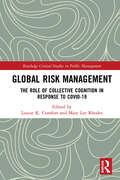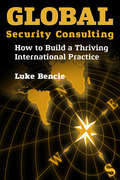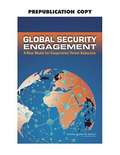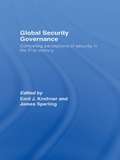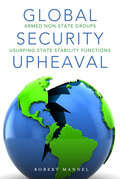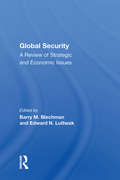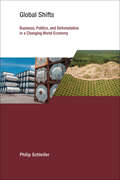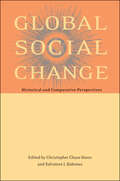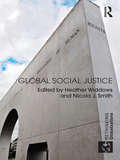- Table View
- List View
Global Resurgence of the Right: Conceptual and Regional Perspectives (Routledge Studies in Fascism and the Far Right)
by Gisela Pereyra Doval Gastón SouroujonThis book provides a broad-ranging analysis of the global resurgence of right-wing forces in the twenty-first century. These parties, organisations and social movements represent a break from right-wing forces in interwar political history in Europe and the United States, and the right-wing dictatorships in Latin America. The book reflects on the most appropriate conceptual categories to account for this phenomenon and whether terms such as populism, fascism, authoritarianism or conservatism can explain the new manifestations of the right. The book also explores this through a range of national case studies written by country specialists, focusing on Austria, Italy, Spain, Argentina, Brazil, Ecuador and the United States of America. Providing a much-needed global perspective, this book will be of considerable interest to students and scholars of populism, fascism, right-wing extremism and conservatism.
Global Risk Governance In Health
by Nathalie BrenderEpidemics know no borders and are often characterized by a high level of uncertainty, causing major challenges in risk governance. The author shows the emergence of global risk governance processes and the key role that the World Health Organization (WHO) plays within them.
Global Risk Management: The Role of Collective Cognition in Response to COVID-19 (ISSN)
by Louise K. Comfort Mary Lee RhodesThe rise and spread of Covid-19 in the beginning of 2020 presents a once-in-a-century challenge and opportunity for decision makers, managers, scholars, and citizens to understand the risks, mitigate its impact and prepare for future crises. Drawing on a global network of scholars, this book presents a comparative analysis of ten nations’ response to a global pandemic, while operating nominally under the framework of the World Health Organization. The book introduces the concept of ‘collective cognition’ as an analytic lens for examining the nations’ response to Covid-19 during the first six months of the emerging pandemic (January – June 2020) and draws out insights for improving systems of global risk management. This book addresses four primary audiences: policy-makers and leaders in nations struggling to contain viruses while guiding their societies under threat; academic researchers, students, and educators engaged in preparing the next generation of professionals committed to investigating emerging risk: managers of non-profit and private organizations that operate and maintain the networks of social, technical, and economic services that are essential to functioning communities; and the informed general public interested in understanding this extraordinary sequence of events and in managing the novel risk of COVID-19 in a more informed, responsible way.
Global Risk Management: The Role of Collective Cognition in Response to COVID-19 (Routledge Critical Studies in Public Management)
by Louise K. Comfort Mary Lee RhodesThe rise and spread of Covid-19 in the beginning of 2020 presents a once-in-a-century challenge and opportunity for decision makers, managers, scholars, and citizens to understand the risks, mitigate its impact and prepare for future crises. Drawing on a global network of scholars, this book presents a comparative analysis of ten nations’ response to a global pandemic, while operating nominally under the framework of the World Health Organization. The book introduces the concept of ‘collective cognition’ as an analytic lens for examining the nations’ response to Covid-19 during the first six months of the emerging pandemic (January – June 2020) and draws out insights for improving systems of global risk management. This book addresses four primary audiences: policy-makers and leaders in nations struggling to contain viruses while guiding their societies under threat; academic researchers, students, and educators engaged in preparing the next generation of professionals committed to investigating emerging risk: managers of non-profit and private organizations that operate and maintain the networks of social, technical, and economic services that are essential to functioning communities; and the informed general public interested in understanding this extraordinary sequence of events and in managing the novel risk of COVID-19 in a more informed, responsible way.
Global Rivalries: Standards Wars and the Transnational Cotton Trade
by Amy A. QuarkAs the economies of China, India, and other Asian nations continue to grow, these countries are seeking greater control over the rules that govern international trade. Setting the rules carries with it the power to establish advantage, so itOCOs no surprise that everyone wants a seat at the tableOCoor that negotiations over rules often result in stalemates at meeting of the World Trade Organization. Nowhere is the conflict over rule setting more evident than in the simmering OC standards warsOCO over the rules that define quality and enable the adjudication of disputes. aIn "Global Rivalries," Amy A. Quark explores the questions of how rules are made, who makes them, and how they are enforced, using the lens of cottonOCoa simple commodity that has become a poignant symbol of both the crisis of Western rule making power and the potential for powerful new rivals to supplant it. Quark traces the strategies for influencing rule making processes employed not only by national governments but also by transnational corporations, fiber scientists, and trade associations from around the globe. Quark analyzes the efficacy of their approaches and the implications for more marginal actors in the cotton trade, including producers in West Africa. By placing the current contest within the historical development of the global capitalist system, "Global Rivalries "highlights a fascinating interaction of politics and economics.
Global Rules
by Prof. James E. CroninThe Second World War created and the Cold War sustained a #147;special relationship” between America and Britain, and the terms on which that decades-long conflict ended would become the foundation of a new world order. In this penetrating analysis, a new history of recent global politics, author James Cronin explores the dramatic reconfiguring of western foreign policy that was necessitated by the interlinked crises of the 1970s and the resulting global shift toward open markets, a movement that was eagerly embraced and encouraged by the U. S. /U. K. partnership. Cronin’s bold revisionist argument questions long-perceived views of post#150;World War II America and its position in the world, especially after Vietnam. The author details the challenges the economic transition of the 1970s and 1980s engendered as the United States and Great Britain together actively pursued their shared ideal of an international assemblage of market-based democratic states. Cronin also addresses the crises that would sorely test the system in subsequent decades, from human rights violations and genocide in the Balkans and Africa to 9/11 and militant Islamism in the Middle East to the #147;Great Recession” of 2008.
Global Security Consulting: How to Build a Thriving International Practice
by Luke BencieWith new security threats nearly every week all over the globe, governments and businesses are forced to take extraordinary measures to protect themselves. Likewise, espionage continues at levels comparable to the days of the Cold War--but many more players are now participating. In this environment, a new industry has grown to deal with these challenges: international security consulting. Drawing from military, law-enforcement, and intelligence communities, new private companies are springing up across the world. Global Security Consulting, written by a former intelligence specialist who has built a successful consultancy, provides solid guidance for anyone wishing to enter this glamorous but often dangerous field.
Global Security Engagement: A New Model for Cooperative Threat Reduction
by National Academy of Science the National AcademiesThe government's first Cooperative Threat Reduction (CTR) programs were created in 1991 to eliminate the former Soviet Union's nuclear, chemical, and other weapons and prevent their proliferation. The programs have accomplished a great deal: deactivating thousands of nuclear warheads, neutralizing chemical weapons, converting weapons facilities for peaceful use, and redirecting the work of former weapons scientists and engineers, among other efforts. Originally designed to deal with immediate post-Cold War challenges, the programs must be expanded to other regions and fundamentally redesigned as an active tool of foreign policy that can address contemporary threats from groups that are that are agile, networked, and adaptable. As requested by Congress, Global Security Engagement proposes how this goal can best be achieved. To meet the magnitude of new security challenges, particularly at the nexus of weapons of mass destruction and terrorism, Global Security Engagement recommends a new, more flexible, and responsive model that will draw on a broader range of partners than current programs have. The White House, working across the Executive Branch and with Congress, must lead this effort.
Global Security Governance: Competing Perceptions of Security in the Twenty-First Century
by James Sperling Emil J. KirchnerThis book demarcates the barriers and pathways to major power security cooperation and provides an empirical analysis of threat perception among the world’s major powers. Divided into three parts, Emil Kirchner and James Sperling use a common analytical framework for the changing security agenda in Canada, France, Germany, Italy, Japan, the Russian Federation, the United States, the United Kingdom, and the EU. Each chapter features: an examination of national ‘exceptionalism’ that accounts for foreign and security policy idiosyncrasies definitions of the range of threats preoccupying the government, foreign policy elites and the public assessments of the institutional and instrumental preferences shaping national security policies investigations on the allocation of resources between the various categories of security expenditure details on the elements of the national security culture and its consequences for security cooperation. Global Security Governance combines a coherent theoretical framework with strong comparative case studies, making it ideal reading for all students of security studies.
Global Security Upheaval: Armed Non-state Groups Usurping State Stability Functions
by Robert MandelThis book calls into question the commonly held contentions that central governments are the most important or even the sole sources of a nation's stability, and that subnational and transnational nonstate forces are a major source of global instability. By assessing recent real-world trends, Mandel reveals that areas exist where it makes little sense to rely on state governments for stability, and that attempts to bolster such governments to promote stability often prove futile. He demonstrates how armed nonstate groups can sometimes provide local stability better than states, and how power-sharing arrangements between states and armed nonstate groups may sometimes be viable. He concludes that these trends in the international setting call for major shifts in our understanding of what constitutes stable governance — proposing that we adopt a fluid "emergent actor" approach. And he calls for significant deviation from standard policy responses to the opportunities and dangers posed by nontraditional sources of national authority.
Global Security Watch: Kenya
by Donovan C. ChauAn original study on the strategic dimensions of Kenya encompasses in-depth examinations of the Kenya Armed Forces, political and military relations with key neighboring countries, and Kenya's crucial strategic relationship with the United States. Includes biographies of Kenya's three presidents since independence. Presents interviews with influential figures. Offers a chronology of Kenya's strategic history from precolonial times to the present. Provides a political map of the African continent and a detailed political map of Kenya. A multifaceted bibliography of key political and military sources--historical, scholarly, and contemporary.
Global Security and the War on Terror: Elite Power and the Illusion of Control (Contemporary Security Studies)
by Paul RogersAs the ‘War on Terror’ evolves into the ‘Long War’ against Islamo-fascism, it demands an enduring commitment to ensuring the security of the United States and its allies. This policy is based on the requirement to maintain control in a fractured and unpredictable global environment, while paying little attention to the underlying issues that lead to insecurity. It is an approach that is manifestly failing, as the continuing problems in Afghanistan and Iraq demonstrate. Moreover, ‘control’ implies the maintenance of a global order that focuses on power remaining in the hands of a transnational elite community, principally focused on North America and Western Europe, but extending worldwide. This elite largely ignores socio-economic divisions and environmental constraints, and sees continuing stability as being best achieved by the maintenance of the status quo, using force when necessary. This collection of essays by Professor Paul Rogers argues that this post-Cold War security paradigm is fundamentally misguided and unsustainable. It concludes with two new essays on the need for a new conception of global security rooted in justice and emancipation. Global Security and the War on Terror will be essential reading for students and scholars of security studies, the Cold War, international relations and development studies.
Global Security in Times of Covid-19: Brave New World? (New Security Challenges)
by Caroline VarinWritten in the middle of a pandemic, this book examines the effect of COVID-19 on regional and global security threats in the first 18 months of the crisis. Throughout history, epidemics have disrupted human civilisations, changed the structure of societies, decided the outcome of wars and prompted incredible technological innovation. Despite massive progress in science, institution-building and cooperation over the past 100 years, COVID-19 has revealed the weaknesses of a world under-prepared for a new disease – that had been widely expected and long overdue! This edited volume brings together leading security experts from Africa, Asia, Europe, the Americas and the Middle East to share their analysis of the COVID-19 outbreak and its impact on major security threats, including the rise of terrorists and criminal networks and global power politics. The book highlights important lessons learnt from all corners of the planet, in particular the need for cross-sectional, regional and international cooperation and solidarity when it comes to facing any transnational security threat that does not respect political boundaries.
Global Security in the Twenty-First Century: The Quest for Power and the Search for Peace
by Sean KayThis thoroughly updated edition of Global Security in the Twenty-First Century offers a balanced introduction to contemporary security dilemmas throughout the world. Sean Kay assesses the impact of the global economic crisis on international security and considers how the range of thinking about power and peace has evolved in relation to major flashpoints including in the Middle East, Asia, and Eurasia. Kay builds on the first and second edition’s emphasis on the roles of trade and technology, the militarization of space, the privatization of security, the use of sanctions, ethnic conflict, and transnational crime. This edition goes even farther to incorporate traditional thinking about national security in the context of human rights, democracy, population, health, environment, energy, and especially education. The author includes full updates on emerging challenges out of Iraq, Russia, and viral diseases in the context of larger strategic questions like the rise of China and America’s “pivot” to rebalance its priorities toward Asia. Writing in an engaging style, Kay integrates traditional and emerging challenges in one easily accessible study that gives readers the tools they need to develop a thoughtful and nuanced understanding of global security.
Global Security: A Review Of Strategic And Economic Issues
by Barry M BlechmanThis overview of world affairs provides a comprehensive assessment of the important trends and events during 1986 and the first half of 1987 that will have a decisive impact on U.S. security. Combining the expertise of an eminent group of regional specialists, economists, and military analysts, Global Security: A Review of Strategic and Economic
Global Shadows: Africa in the Neoliberal World Order
by James FergusonBoth on the continent and off, "Africa" is spoken of in terms of crisis: as a place of failure and seemingly insurmountable problems, as a moral challenge to the international community. What, though, is really at stake in discussions about Africa, its problems, and its place in the world? And what should be the response of those scholars who have sought to understand not the "Africa" portrayed in broad strokes in journalistic accounts and policy papers but rather specific places and social realities within Africa? In Global Shadows the renowned anthropologist James Ferguson moves beyond the traditional anthropological focus on local communities to explore more general questions about Africa and its place in the contemporary world. Ferguson develops his argument through a series of provocative essays which open--as he shows they must--into interrogations of globalization, modernity, worldwide inequality, and social justice. He maintains that Africans in a variety of social and geographical locations increasingly seek to make claims of membership within a global community, claims that contest the marginalization that has so far been the principal fruit of "globalization" for Africa. Ferguson contends that such claims demand new understandings of the global, centered less on transnational flows and images of unfettered connection than on the social relations that selectively constitute global society and on the rights and obligations that characterize it. Ferguson points out that anthropologists and others who have refused the category of Africa as empirically problematic have, in their devotion to particularity, allowed themselves to remain bystanders in the broader conversations about Africa. In Global Shadows, he urges fellow scholars into the arena, encouraging them to find a way to speak beyond the academy about Africa's position within an egregiously imbalanced world order.
Global Shanghai Remade: The Rise of Pudong New Area
by Richard Hu Weijie ChenExamining the rise of Pudong and its role in re-creating Shanghai as a global city, Global Shanghai Remade utilises this important case study to shed light on contemporary globalisation and China’s integration with the world since the late 20th century. Unpacking the rise of Pudong in the context of Deng Xiaoping’s nation-building agenda, this book explores the development of the district from its earliest planning into a global city centre through multiple perspectives. In doing so, it explores the role of key decision-makers and actors, the strategic planning process, the approaches to urban development, and some of the iconic projects that define the rise of Pudong, Shanghai, and China itself. A timely volume for the 30th anniversary of China’s strategy of ‘developing and opening Pudong,’ it combines the analyses and findings from these perspectives into a framework for a broader understanding of city-making with Chinese characteristics. The first study of its kind, providing a comprehensive and systematic examination of Pudong, this book will be useful for students and scholars of urban planning and design, as well as Chinese Studies and Development Studies more generally.
Global Shell Games
by J. C. Sharman Michael G. Findley Daniel L. Nielson Michael G. Findley Daniel L. NielsonEvery year a staggering number of unidentified shell corporations succeed in hiding perpetrators of terrorist financing, corruption and illegal arms trades, but the degree to which firms flout global identification standards remains unknown. Adopting a unique, experimental methodology, Global Shell Games attempts to unveil the sordid world of anonymous shell corporations. Posing as twenty-one different international consultants, the authors approached nearly 4,000 services in over 180 countries to discover just how easy it is to form an untraceable company. Combining rigorous quantitative analysis, qualitative investigation of responses and lurid news reports, this book makes a significant research contribution to compliance with international law and international crime and terrorism whilst offering a novel, new approach to the field of political science research. Global Shell Games is an invaluable resource for scholars of international relations, and a fascinating, accessible read for anyone interested in learning about worldwide criminal practice in corporate finance.
Global Shift, Seventh Edition
by Peter DickenThe definitive text on globalization, this book provides an accessible, jargon-free analysis of how the world economy works and its effects on people and places. Peter Dicken synthesizes the latest ideas and empirical data to blaze a clear path through the thicket of globalization processes and debates. The book highlights the dynamic interactions among transnational corporations, nations, and other key players, and their role in shaping the uneven contours of development. Mapping the changing centers of gravity of the global economy, Dicken presents in-depth case studies of six major industries. Now in full color throughout, the text features 228 figures. Companion websites for students and instructors offer extensive supplemental resources, including author videos, applied case studies with questions, lecture notes with PowerPoint slides, discipline-specific suggested further reading for each chapter, and interactive flashcards. New to This Edition: *Every chapter thoroughly revised and updated. *All 228 figures (now in color) are new or redesigned. *Addresses the ongoing fallout from the recent global financial crisis. *Discussions of timely topics: tax avoidance and corporate social responsibility; global problems of unemployment, poverty, and inequality; environmental degradation; the Eurozone crisis; and more. *Enhanced online resources for instructors and students.
Global Shifts: Business, Politics, and Deforestation in a Changing World Economy
by Philip SchleiferWhat global shifts in markets and power mean for the politics and governance of sustainability.In recent years, major shifts in global markets from North to South have created a new geography of trade and consumption, particularly in the agricultural sector. How this shift affects the governance of sustainability, and thus the future of the planet, is the pressing topic Philip Schleifer takes up in this book. The processes of twenty-first-century globalization are fundamentally changing the politics and governance of commodity production, Schleifer argues, with profound implications for the environment in the food-producing countries of the Global South. At the center of Schleifer's study are Brazil and Indonesia—two key sites of experimentation in new models of global environmental and commodity governance—where palm oil and soy supply chains have seen unprecedented degrees of private environmental governance in recent years. However, instead of transforming these industries, the diffusion of transnational sustainability standards has accompanied a worsening ecological crisis, with mounting evidence of increasingly strong links between deforestation and globalization in twenty-first-century agricultural trade. To uncover the causes of this governance failure, Schleifer develops a multi-level framework for analyzing how contemporary globalization is reconfiguring the political economies of such industries. The result is the first comprehensive analysis of the shift of global agricultural trade to the South and the deepening crisis of commodity-driven deforestation—and a complex and evolving picture of both the risks and opportunities for sustainability presented by this transformative shift.
Global Shipping in Small Nations
by Stig Tenold Martin Jes Iversen Even LangeThis anthology aims to explain why some Nordic shipping companies became world leaders while others failed to respond effectively to the challenges and opportunities of globalization. The authors analyse political and institutional patterns alongside the various corporate responses to the many upheavals of global shipping.
Global Slump: The Economics and Politics of Crisis and Resistance (Spectre)
by David McNallyInvestigating the global financial meltdown as the first systemic crisis of the neoliberal stage of capitalism, this analysis argues that—far from having ended—the crisis has ushered in a period of worldwide economic and political turbulence. In developing an account of the crisis as rooted in fundamental features of capitalism, this study challenges the view that capitalism's source lies in financial deregulation, and highlights the emergence of new patterns of world inequality and new centers of accumulation, particularly in East Asia, and the profound economic instabilities these have produced. This original account of the "financialization" of the world economy during this period explores the intricate connections between international financial markets and new forms of debt and dispossession. Analyzing the massive intervention of the world's central banks to stave off another Great Depression, this study shows that while averting a complete meltdown, this intervention also laid the basis for recurring crises for poor and working class people: job loss, increased poverty and inequality, and cuts in social programs. Taking a global view of these processes, exposing the damage inflicted on countries in the Global South, as well as the intensification of racism and attacks on migrant workers, this book also traces new patterns of social and political resistance—from housing activism and education struggles, to mass strikes and protests in Martinique, Guadeloupe, France, and Puerto Rico—as indicators of the potential for building anticapitalist opposition to the damage that neoliberal capitalism is inflicting on the lives of millions.
Global Social Change: Historical and Comparative Perspectives
by Christopher Chase-Dunn and Salvatore J. BabonesThis informative and exciting volume brings together accomplished sociologists and scholars to offer an introduction to ways of studying and understanding global social change.The essays in Global Social Change explore globalization from a world-systems perspective, untangling its many contested meanings. This perspective offers insights into globalization's gradual and uneven growth throughout the course of human social evolution. In this informative and exciting volume, Christopher Chase-Dunn and Salvatore J. Babones bring together accomplished senior sociologists and outstanding younger scholars with a mix of interests, expertise, and methodologies to offer an introduction to ways of studying and understanding global social change.In both newly written essays and previously published articles from the Journal of World Systems Research, the contributors employ historical and comparative social science to examine the development of institutions of global governance, the rise and fall of hegemonic core states, transnational social movements, and global environmental challenges. They compare post–World War II globalization with the great wave of economic integration that occurred in the late nineteenth century, analyze the rise of the political ideology of the "globalization project"—Reaganism-Thatcherism—and discuss issues of gender and global inequalities.
Global Social Justice (Rethinking Globalizations)
by Heather Widdows Nicola J. SmithGlobal Social Justice provides a distinctive contribution to the growing debate about global justice and global ethics. It brings a multi-disciplinary voice – which spans philosophical, political and social disciplines – and emphasises the social element of global justice in both theory and practice. Bringing together a number of internationally renowned scholars, the book explicitly addresses debates about the scope and hierarchies of justice and considers how different approaches and conceptions of justice inter relate. It explores a diversity of themes relating to global social justice including globalisation, human rights, ecological justice, gender and sexuality, migration and trafficking, global health challenges, post-conflict resolution and torture. Global Social Justice will be vital reading for anyone interested in the political/philosophical theories and practical issues surrounding global social justice, including students and scholars of Political Science, International Relations, Philosophy, Global Ethics, Environmental Studies, Development Studies, Human Rights Law and Global Studies.
Global Social Policy in the Making: The Foundations of the Social Protection Floor
by Bob DeaconThe global economic crisis continue to dominate headlines, yet measures to build a social floor under the global economy and reform global governance have received little attention. In 2012 the Social Protection Floor was adopted as a global social policy measure ensuring that all could have access to essential health care and income security over their lifespan. This book by the world’s leading authority on global social policy examines why and how the Social Protection Floor became ILO, UN and G20 policy and how the World Bank and IMF took steps to lay its foundation. Bob Deacon explains this development in terms of four influences: firstly, shifts in the global social structure, secondly, processes inside international institutions, thirdly, global actors -sometimes individuals - using their positions to make change, and fourthly, shifting discourses about social protection. This much-needed contribution to the field of global social policy will be of interest to students of international relations, international organization and development studies and should be read by international civil servants in global agencies.


